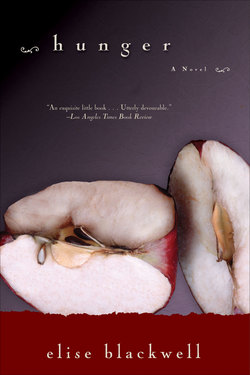Читать книгу Hunger - Elise Blackwell - Страница 1
На сайте Литреса книга снята с продажи.
ОглавлениеACCLAIM FOR
ELISE BLACKWELL’S
Hunger
“An exquisite little book. . . . A multicolored treat. . . . Blackwell craftily weaves history and botany through this utterly devourable narrative. . . . Hunger, like any great book, raises as many questions as it answers. . . . A compact embarrassment of riches.”
— Mark Rozzo, Los Angeles Times
“All the more chilling for its poetic economy, Hunger captures a sweeping catastrophe through one man’s tale of belated conscience. It is a haunting reminder that history has no mercy, that no matter how lofty our circumstances or our ideals, we may be tested terribly at any moment by the times in which we live.”
— Julia Glass, author of the
National Book Award–winning Three Junes
“A story of desperation in its rawest form. . . . Insightful and gripping. . . . Hunger examines both the limitations and the possibilities of the human character when deprived of the ability to satisfy primal needs. . . . Blackwell’s stark novel is fascinating for its study of how human behavior shifts when faced with the most extreme circumstances and when motivated by fear. Her characters strive to make sense of suffering, to find meaning in it, but are bereft. Hunger brings human behavior into sharp relief.”
— Carmela Ciuraru, San Francisco Chronicle
“A lyrical, haunting story about the cost of survival.”
— Joanne Wilkinson, Booklist
“A remarkable, fact-based story of heroism and self-sacrifice under the harshest of war’s privations and of the desperate will to survive. . . . The prose of Hunger is terse, stripped to essentials, but it produces a lilting, nearly poetic quality. The detail is exacting and freshly presented. . . . A compelling exploration of the moral chasm that war can create.”
— Harold Parker, BookPage
“An evocative account of a nameless man’s efforts to survive while all around him are dying. . . . Blackwell is brave in her assertions even if her narrator isn’t.”
— Mary McCay, New Orleans Times-Picayune
“Ms. Blackwell writes in a lucid, serene style, which contrasts with her grim subject matter and increases its nightmarish quality. . . . As the narrator recalls these gruesome stories in small, slow-moving vignettes, they build like stanzas of a prose poem. Juxtaposed one against the other, they suggest a profoundly disturbing reality.”
— Diane Scharper, Wall Street Journal
“An eccentric, courageous, and poetic study of human beings in extremis.”
— Julia Blackburn, author of
The Leper’s Companions and Old Man Goya
“A riveting fictional account, based on real events. . . . This stark debut novel is a poignant look at a wrenching period of history.”
— Kristin Kloberdanz, Chicago Tribune
“A quietly effective, poignant debut. . . . Blackwell offers gemlike observations and sensory detail. . . . The juxtaposition of the gnawing torment of starvation with the narrator’s memory of the exotic foods he collected and ate on his travels around the world before the war furnishes the novel with many of its tensions and delights. . . . A well-crafted novel that works largely because of its small, evocative moments.”
— Publishers Weekly
“Blackwell’s disciplined economy of prose enables her to write a complex story in concise, lean chapters. . . . The juxtaposition of passages exploding with the fertile images of Babylonia’s famed Hanging Gardens against the sterility of a life where even tree bark is a luxury gives a heightened intensity and human face to a historical story.”
— Joan Hinkemeyer, Denver Rocky Mountain News
“A sparse, exquisitely written story. . . . This tale of cowardice, bravery, and betrayal will linger long after the book is returned to the shelf.”
— Robert Francis, Aptos Times
